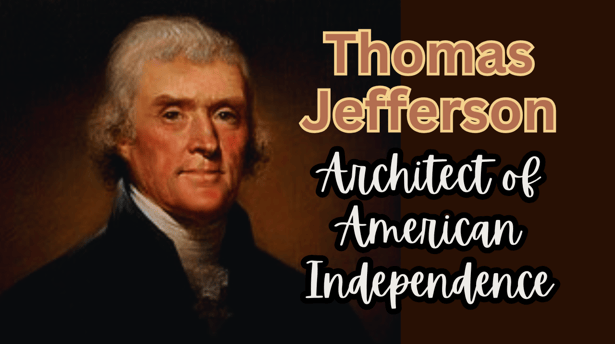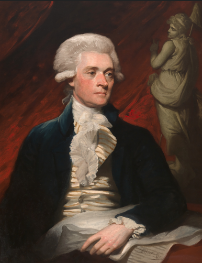Thomas Jefferson: “Architect of American Independence and Enlightenment Ideals”
Thomas Jefferson (April 13 [O.S. April 2], 1743 – July 4, 1826) was a revolutionary thinker, statesman, and one of the most influential Founding Fathers of the United States. Serving as the third president of the United States (1801–1809), Jefferson’s legacy includes his authorship of the Declaration of Independence, his contributions to American political thought, and his pivotal roles in shaping the early republic.
Casey Adams
11/9/20234 min read


Early Life and Education:
A Virginia Planter's Son
Born into the planter aristocracy of colonial Virginia, Thomas Jefferson grew up in a world deeply rooted in agrarian traditions and reliant on enslaved labor.
His father, Peter Jefferson, was a surveyor and landowner, and his mother, Jane Randolph, was from one of Virginia’s most prominent families.
Jefferson inherited this privileged yet complex environment.
Educated at the College of William & Mary, Jefferson excelled in classical studies, mastering Greek, Latin, philosophy, and law.
Influenced by Enlightenment thinkers like John Locke, Francis Bacon, and Isaac Newton, Jefferson developed a lifelong belief in the power of reason and the rights of individuals—concepts that would later underpin his political ideology.
Revolutionary Thought:
Jefferson and the Declaration of Independence
Jefferson’s first significant role in shaping the future United States came during the American Revolution.
Representing Virginia at the Second Continental Congress in 1776, Jefferson was tasked with drafting the Declaration of Independence. His eloquent writing articulated the colonies’ grievances against King George III and expressed the universal principles of liberty and equality.
Jefferson’s most famous phrase, “all men are created equal,” became a cornerstone of American freedom, though its full implications would remain a source of contention due to the institution of slavery, which Jefferson himself was deeply entangled in.
Governor of Virginia:
Revolutionary Challenges
As the second governor of Virginia (1779–1781), Jefferson faced the daunting task of leading a state during wartime.
His tenure was marked by British invasions, economic instability, and internal dissent.
Despite these challenges, Jefferson took steps to reform Virginia’s laws, including efforts to separate church and state and to modernize the state’s legal code.
Jefferson’s governorship ended under scrutiny following British General Benedict Arnold’s raids into Virginia, which forced Jefferson to flee Monticello, his iconic plantation.
Despite criticism, Jefferson’s tenure laid the groundwork for Virginia’s transition from a colonial stronghold to a revolutionary state.
Diplomatic Service in France:
Shaping International Alliances
In 1785, Congress appointed Jefferson as the U.S. minister to France, succeeding Benjamin Franklin. During his years in Paris (1785–1789), Jefferson witnessed the early stages of the French Revolution and became an advocate for republican ideals abroad.
While in France, Jefferson worked to strengthen the alliance between the fledgling United States and its French allies.
He also gained insights into European politics, economics, and culture, which influenced his vision for America as an agrarian republic grounded in equality and self-governance.
Secretary of State:
Building the Young Republic
Returning to the United States, Jefferson served as the first U.S. secretary of state under President George Washington (1790–1793).
In this role, Jefferson clashed with Treasury Secretary Alexander Hamilton over the direction of the nation.
While Hamilton favored a strong centralized government and a national bank, Jefferson championed states’ rights and a decentralized agrarian economy.
This ideological divide led to the formation of the Democratic-Republican Party, which Jefferson co-founded with James Madison to counter the Federalist Party.
This rivalry between Jeffersonian Republicans and Hamiltonian Federalists became the foundation of the United States’ First Party System.
Vice Presidency and the "Revolution of 1800"
In the presidential election of 1796, Jefferson finished second to John Adams, becoming vice president under the electoral laws of the time.
During his tenure as vice president, Jefferson quietly organized opposition to Adams’ Federalist policies, particularly the Alien and Sedition Acts, which he viewed as an assault on individual liberties.
In 1800, Jefferson ran against Adams again, in what became a contentious and transformative election.
Dubbed the “Revolution of 1800,” Jefferson’s victory marked the first peaceful transfer of power between political parties in U.S. history—a testament to the resilience of the young republic.
Presidency:
Achievements and Controversies
As the third president of the United States (1801–1809), Jefferson’s administration was defined by both visionary accomplishments and controversial decisions.
His presidency emphasized limited government, reduced military expenditures, and a focus on expanding the agrarian economy.
Key achievements during Jefferson’s presidency:
The Louisiana Purchase (1803): Jefferson doubled the size of the United States by acquiring territory from France, securing American control of the Mississippi River and opening vast lands for westward expansion.
The Lewis and Clark Expedition (1804–1806): Jefferson commissioned explorers Meriwether Lewis and William Clark to map the newly acquired western territories, promoting scientific discovery and territorial claims.
Reform of Government: Jefferson worked to reduce national debt, repeal internal taxes, and dismantle Federalist policies, aligning the government more closely with his vision of republican simplicity.
Controversies during Jefferson’s presidency:
The Embargo Act (1807): A response to British and French interference with American trade, the act severely damaged the U.S. economy and proved deeply unpopular, particularly in New England.
Slavery and Hypocrisy: Despite his advocacy for liberty, Jefferson enslaved over 600 individuals during his lifetime. His relationship with Sally Hemings, an enslaved woman at Monticello, remains a point of historical and ethical debate.
Post-Presidency:
The Sage of Monticello
After leaving the presidency in 1809, Jefferson retired to Monticello, where he continued to correspond with political allies and foreign leaders.
His later years were dedicated to founding the University of Virginia, which reflected his belief in the power of education to sustain a democratic society.
Jefferson’s correspondence with John Adams during these years showcased a rekindled friendship and a shared reflection on their revolutionary experiences.
Remarkably, both men died on July 4, 1826, the 50th anniversary of the Declaration of Independence.
Legacy:
Architect of Liberty
Thomas Jefferson’s legacy is a complex and multifaceted one. As a philosopher of liberty, his writings and ideas have inspired movements for freedom worldwide.
As a statesman, his policies helped shape the foundation of the United States.
However, his participation in and defense of slavery complicates his standing in history.
Jefferson remains an enduring symbol of America’s revolutionary ideals and contradictions.
His contributions to the Declaration of Independence and his vision for an educated and free society continue to resonate, making him one of the most significant figures in the history of the United States.
References:
Ellis, Joseph J. "American Sphinx: The Character of Thomas Jefferson." Vintage, 1998.
Meacham, Jon. "Thomas Jefferson: The Art of Power." Random House, 2012.
Jefferson, Thomas. "The Declaration of Independence" (1776).
Onuf, Peter S. "Thomas Jefferson, Author of America." University Press of Virginia, 1996.



Thomas Jefferson

